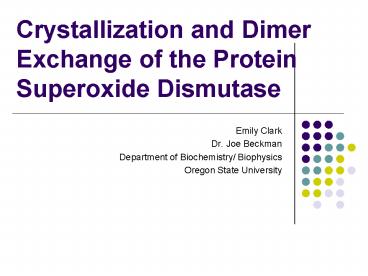Crystallization and Dimer Exchange of the Protein Superoxide Dismutase - PowerPoint PPT Presentation
1 / 17
Title:
Crystallization and Dimer Exchange of the Protein Superoxide Dismutase
Description:
Usually die within 2-5 years of being diagnosed, 10% live more than 10 years ... Hope to produce large, pure, single crystal that will diffract X-rays ... – PowerPoint PPT presentation
Number of Views:34
Avg rating:3.0/5.0
Title: Crystallization and Dimer Exchange of the Protein Superoxide Dismutase
1
Crystallization and Dimer Exchange of the Protein
Superoxide Dismutase
- Emily Clark
- Dr. Joe Beckman
- Department of Biochemistry/ Biophysics
- Oregon State University
2
Amyotrophic Lateral SclerosisLouis Gehrig Disease
- Fatal neurodegenerative disease targeting
motorneurons - Incidence 3/100,000 people
- Usually die within 2-5 years of being diagnosed,
10 live more than 10 years - 90 of ALS cases are sporadic
- 2-3 of victims inherit dominant autosomal
mutations in the gene coding for superoxide
dismutase (SOD) - Over 100 mutations in the gene coding for SOD
linked to ALS
3
Cu, Zn Superoxide Dismutase (SOD)
- 153 amino acids
- Dimer with two identical subunits each binding
one Zn atom and one Cu atom - Normally functions as a superoxide (O2-)
scavenger in cells throughout the body - Cu2SOD O2- O2
Cu1SOD O2- H2O2 - Experiments with transgenic animals show that
mutant SOD has a toxic gain in function - Mutant SOD has reduced binding affinity for Zn
4
Zn - deficient SOD Hypothesis
5
Toxicity of Zn-deficient SOD
- Zn-deficient SOD delivered to motor neurons
causes 50 killing after 24 hrs. - Zn(-)SOD Cu,Zn-SOD results in 90 killing of
motor neurons - Hypothesize heterodimer formation
Cu
Cu
SOD Heterodimer
Zn
6
First Objective Crystallization
- Solve structure of two proteins
- Zn(-) C111S SOD
- SOD Heterodimer
- Goal grow crystal, use X-ray diffraction to
model structure - Hanging Drop Method
- Crystal Screen About 50 different buffer and
salt solutions widely used as starting points
- Solvents transferred according to vapor pressure
of sample versus reservoir
7
The Art of Growing Crystals
- Screen conditions and work toward optimizing
conditions - Hope to produce large, pure, single crystal that
will diffract X-rays
8
(No Transcript)
9
Diffraction Pattern
10
X-Ray Diffraction
The UKs new Diamond synchrotron
11
Second Objective Investigating Dimer Exchange
Cu, Zn Cu, Zn Cu, Zn Cu, Zn
Cu, Zn Cu, Zn Homodimer 1
Homodimer 2 Homodimer 3
- What is the rate of dimer exchange?
- How does it compare to rate of exchange between
Cu, Zn SOD and Zn-deficient SOD?
12
Fluorescence Resonance Energy Transfer (FRET)
- Half SOD labeled with donor fluorophore, half
labeled with acceptor fluorophore - Excite donor, measure the change in acceptors
fluorescence intensity over time
- As dimer exchange occurs, donor fluorophore and
acceptor fluorophore come into close enough
proximity for FRET to occur
Donor labeled Acceptor labeled
protein protein
13
Data
Emission Spectra of Bovine SOD (exchange rate
known) Donor Emission Acceptor
Emission
- Expect fluorescence intensity of donor to
decrease while fluorescence intensity of acceptor
increases as more dimer exchange occurs - Emission spectra shows increase in both donor
and acceptor fluorescence
F L U O R E S C E N C E
14
Controls
Measuring changes in fluorescence intensity over
time of acceptor-labeled Wt Cu, Zn SOD alone
using FRET wavelengths
F L U O R E S C E N C E
Time (min)
15
Conclusions
- Possible explanations for FRET results
- Self-quenching
- Evaporation
- Labeling affected protein structure
- Formation of monomers
16
Future Work
- Alternative method for measuring rate of
homodimer SOD exchange needed - Possibly Surface Plasmon Resonance (SPR)
17
Acknowledgments
- HHMI Program
- Dr. Kevin Ahern
- Dr. Joe Beckman
- Dr. Andy Karplus
- Blaine Roberts
- Rick Faber
- Beckman lab
- Schimerlik lab































